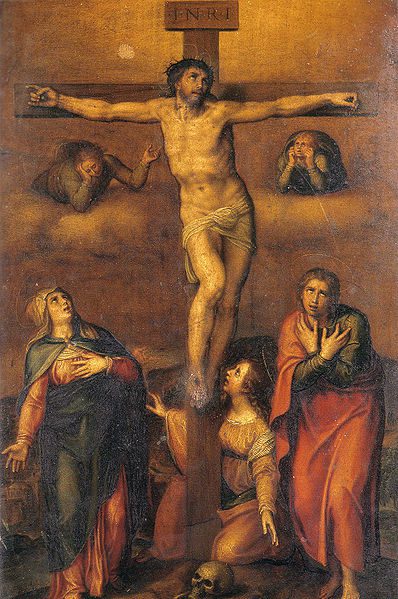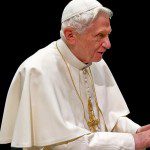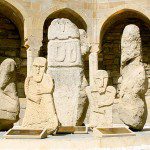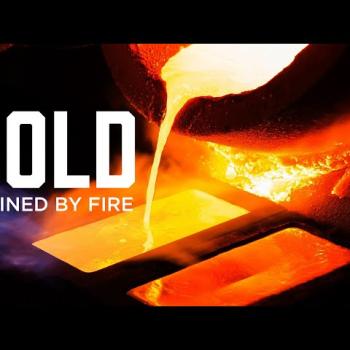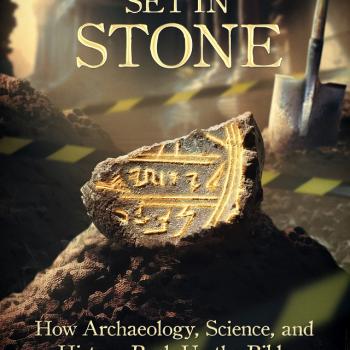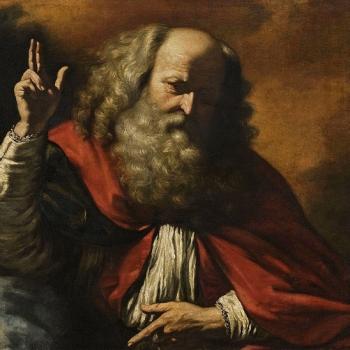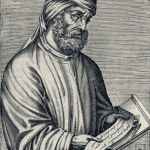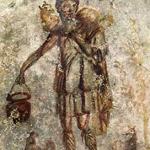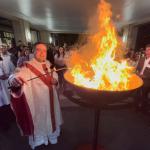Christ on the Cross (1540), by Michelangelo (1475-1564) [public domain / Wikimedia Commons]
* * *
[from my book, The One-Minute Apologist (2007); my original manuscript version is edited presently, to expand upon the actual book portions. So here you get a “deluxe” two-minute response, rather that a one-minute one.]
THEOLOGY OF GOD
Jesus had to grow into the understanding that He was God
He was limited in His awareness and in His learning abilities because He was a man, like the rest of us
The One-Minute Apologist Says:
The confusion here among some comes from the fact that Jesus had two natures: divine and human (the “hypostatic union”). In His divine nature He was omniscient, yet in his human nature He had to learn and grow like any other human being. Jesus was both fully God and fully man.
Jesus had at all times the attributes of God and also those of man. He wasn’t “half-and-half” with a hybrid “divine-human nature” (this is the heresy of Monophysitism), but rather, God and man simultaneously. Yet the two natures remain separate. These theological definitions are supremely important because Jesus was both God (the Second Person of the Trinity) and took on flesh to become man (in the Incarnation). Both teachings needed to be fully preserved, rather than one nature being emphasized over the other (an overemphasis on the human nature of Christ at the expense of the divine is the heresy of Nestorianism). Omniscience (knowledge of all things) was not a characteristic of Jesus’ human intellect or nature, but it was part of His divine nature. Jesus’ human nature meant that He could progressively learn, just like all men do, yet at the same time in His divine nature He knew all things. The two natures unite in the Person of Jesus Christ.
Jesus’ knowledge (per the above) could seem to be limited in some Scripture passages (e.g., Mt. 24:36: “But of that day and hour no one knows, not even the angels of heaven, nor the Son, but the Father only.”), whereas in others He seems to have divine knowledge of all things. In becoming man, Jesus (according to Philippians 2:5-8) voluntarily limited Himself in His human nature, but not His divine. Many other passages show that Jesus possessed the quality of omniscience in His divine nature, including knowing at all times that He was God; He didn’t “grow” into that “consciousness”:
John 16:28-30 [RSV]: “’I came from the Father and have come into the world; again, I am leaving the world and going to the Father.’ His disciples said, ‘Ah, now you are speaking plainly, not in any figure! Now we know that you know all things, and need none to question you . . .’” (cf. Mt. 6:8)
John 18:4: “. . . Jesus, knowing all that was to befall him . . .” (cf. Acts 15:18)
John 18:36-37: “Jesus answered, ‘My kingship is not of this world; if my kingship were of this world, my servants would fight, that I might not be handed over to the Jews; but my kingship is not from the world.’ Pilate said to him, ‘So you are a king?’ Jesus answered, ‘You say that I am a king. For this I was born, and for this I have come into the world, to bear witness to the truth. Every one who is of the truth hears my voice.’” (cf. Mt. 16:15-20; Lk. 4:41; Jn. 4:25-26)
John 21:17: “’ . . . Lord, you know everything . . .’” (cf. 1 Jn. 3:20)
Colossians 2:2-3: “ . . . Christ, in whom are hid all the treasures of wisdom and knowledge.” (cf. Rom. 11:33-34)
Other passages, while not in themselves proof of omniscience, do provide evidence (in terms of supernatural knowledge) that Jesus was more than a mere man (Mt. 9:4; 12:25; Mk. 2:8; Lk. 6:8; 9:47; 22:10-13; Jn. 6:64; 13:1,10-11). Additionally, there are many other verses illustrating that Jesus knew the future perfectly (Mt. 12:40; 16:21; 17:9,11-12,22-23; 20:18-19; 21:39; 24:2; 26:2,12,21,31-34,54; Mk. 8:31; 9:31; 10:32-34; 14:9,18,27-30,42,49; Lk. 9:22,44; 11:30; 12:50; 17:25; 18:31-33; 22:15,21-22,32,34,37; Jn. 2:19; 3:14; 10:11,15,17-18; 12:32-34; 13:18-21; 14:19; 15:13; 16:20; 18:11).
A Protestant [or Modernist] Might Further Object
But Jesus also said God the father was “greater” than he was (Jn. 14:28) and Paul says he was subject to Him (1 Cor. 11:3; 15:28). So how could he be equal to His father? And some Scripture passages, such as Matthew 24:36 (“But of that day and hour no one knows, not even the angels of heaven, nor the Son, but the Father only”), imply that the Person Jesus’ knowledge is limited? Doesn’t that prove that He wasn’t omniscient?
The One-Minute Apologist Says:
Philippians 2:5-8 shows us that Christ in John 14:28 was speaking strictly in terms of his office as Messiah, which entailed a giving up, not of the Divine Nature, but of certain prerogatives of glory and Deity which are enjoyed by the Father. Christ subjected Himself to the Father in order to undertake His role as the Incarnate Son and Mediator between God and man (1 Tim. 2:5). But Jesus is still God, even while “humbling” Himself (Phil. 2:6-7: “he was in the form of God, did not count equality with God a thing to be grasped, but emptied himself, taking the form of a servant”). The Father is called the “head” of the Son (1 Cor. 11:3), but the Bible also talks about wives being subject to their husbands (1 Pet. 3:1,5), even while the two are equals (Gal. 3:28, Eph. 5:21-22), and indeed, “one flesh” (Mt. 19:5-6). Luke 2:51 says that Jesus was “subject” to Mary and Joseph, too, yet He was God and they were mere creatures.
In becoming man, Jesus voluntarily limited Himself in His human nature — but not His divine (see Philippians 2:6-8: “though he was in the form of God, did not count equality with God a thing to be grasped, but emptied himself, taking the form of a servant, being born in the likeness of men. And being found in human form he humbled himself”). Matthew 24:36 simply shows Jesus speaking from His human nature, where He didn’t know all things; speaking as the incarnate Son, Who gave up divine prerogatives in terms of His human nature (while never losing them in His divine nature). Besides, there are many other verses illustrating that Jesus (i.e., in His divine nature) knew the future perfectly:
Matthew 20:18-19: “Behold, we are going up to Jerusalem; and the Son of man will be delivered to the chief priests and scribes, and they will condemn him to death, and deliver him to the Gentiles to be mocked and scourged and crucified, and he will be raised on the third day.” (cf. 16:21; Lk. 18:31-33)
John 6:64: “’But there are some of you that do not believe.’ For Jesus knew from the first who those were that did not believe, and who it was that would betray him.”
(see also: Mt. 12:40; 17:9,11-12,22-23; 21:39; 24:2; 26:2,12,21,31-34,54; Mk. 8:31; 9:31; 10:32-34; 14:9,18,27-30,42,49; Lk. 9:22,44; 11:30; 12:50; 17:25; 22:15,21-22,32,34,37; Jn. 2:19; 3:14; 10:11,15,17-18; 12:32-34; 13:18-21; 14:19; 15:13; 16:20; 18:11).
The teaching of the Catholic Church is this: the unity in Christ did not result from the uniting of his two natures with each other, but in the union of each of them in the Person of the Son of God. The union is thus achieved in the Person (in theological terms this is called the hypostatic union), and not in the natures . . . both divine and human attributes can be predicated of him, although the two natures are separated by an infinite abyss. For example, I can say that Christ is omniscient (as God), but also that he does not know everything (as man); God is lying in the crib (that is, as a man); God is dying on the cross, etc.
Catholic theologian Matthias Premm explains this very important teaching:
One false concept to be avoided is the view that divine and human nature in Christ are united in one single (divine-human) nature, each nature being intimately mixed with the other forming a new entity. This one-nature doctrine (Monophysitism), which flourished in the fifth century, was expressly condemned by the Church in the year 451. Thus, nothing “flows” from Christ’s divine nature into his human nature or vice versa. Both natures remain untouched, unchanged, and completely separate. The Omniscience proper to divine nature, for example, is not a property of Jesus’ human intellect. The teaching of the Catholic Church is this: the unity in Christ did not result from the uniting of his two natures with each other, but in the union of each of them in the Person of the Son of God The union is thus achieved in the Person (in theological terms this is called the hypostatic union), and not in the natures . . . both divine and human attributes can be predicated of him, although the two natures are separated by an infinite abyss. For example, I can say that Christ is omniscient (as God), but also that he does not know everything (as man); God is lying in the crib (that is, as a man); God is dying on the cross, etc.
(Dogmatic Theology for the Laity, Rockford, Illinois: TAN, 1967, 151-152)
* * * * *
[not in the book] Sadly, there are prominent Catholic teachers today, such as Bishop Robert Barron, who continue to teach that Jesus grew into the awareness that He was God. That is contrary to the Bible and dogmatic Catholic teaching on the topic. See Fr. William Most’s treatise, The Consciousness of Christ, and The Double Consciousness of Christ, by Bertrand de Margerie, S. J.


